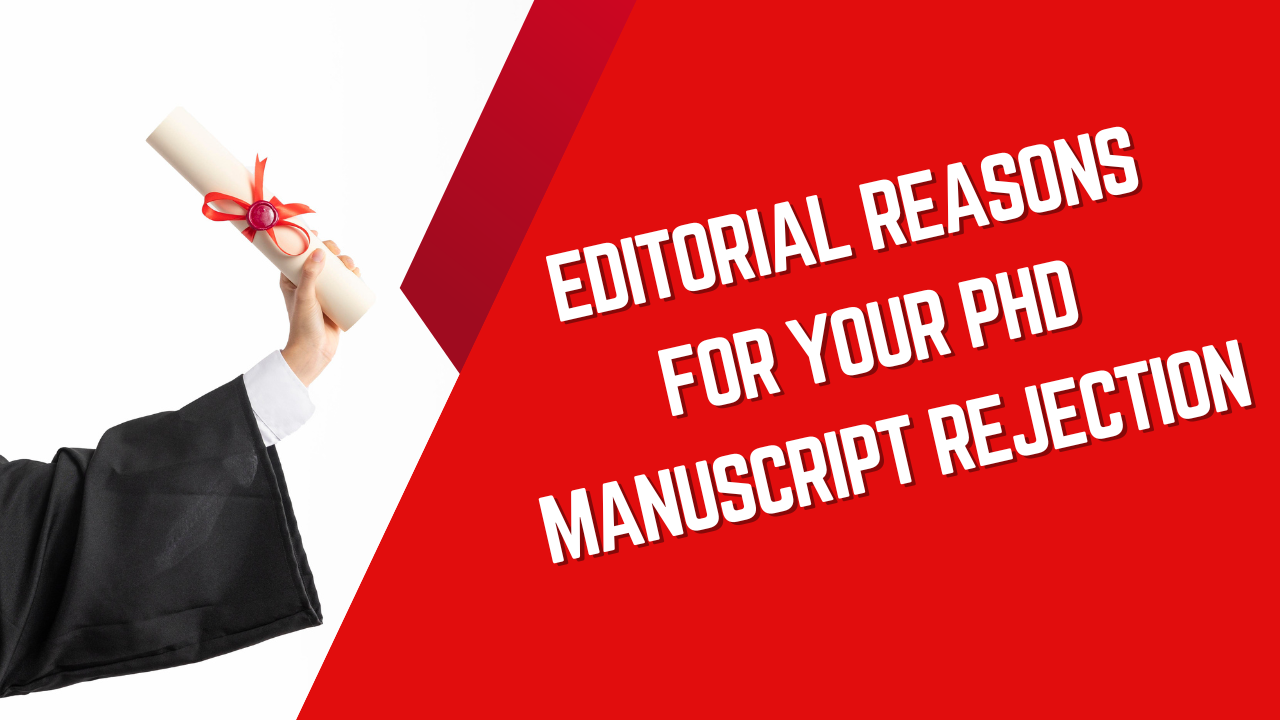10Mar

Publishing Your PhD Manuscript in a reputed journal is a significant milestone in your academic journey. However, many scholars face the disappointment of Your PhD Manuscript Rejection, often due to editorial reasons rather than the quality of their research. Understanding these reasons can help you refine your manuscript and improve its chances of acceptance, reducing the likelihood of Your PhD Manuscript Rejection.

One of the most common editorial reasons for rejection is submitting your manuscript to a journal that does not align with its scope. Before submission, carefully review the journal’s aims and objectives to ensure your research fits within its thematic focus.
Journals have strict formatting guidelines, and failure to adhere to them can lead to immediate rejection. Editors expect a clear structure, including an abstract, introduction, methodology, results, discussion, and conclusion.
The abstract and introduction are the first sections an editor reviews. If they fail to clearly convey the research problem, objectives, and significance, your manuscript may be rejected without further evaluation.
Journals seek novel contributions to the field. If your manuscript lacks originality or appears redundant compared to existing literature, it may be rejected.
Academic integrity is crucial. If your manuscript contains plagiarized content or lacks ethical clearance for research involving human or animal subjects, it will likely be rejected.
A poorly explained methodology or insufficient data can weaken the credibility of your research. Editors look for clear, reproducible methods and robust data analysis.
Solution:
Manuscripts with poor language quality, grammatical mistakes, and unclear expressions are often rejected by editors.
A weak or outdated literature review can indicate a lack of understanding of the existing research landscape.
If your manuscript has been previously submitted and rejected with reviewer comments, failure to address those concerns can lead to another rejection.
Manuscripts that make bold claims without sufficient data or evidence to support them are often rejected.
Many manuscripts are rejected simply because they do not comply with the submission guidelines.
Unclear or improperly formatted figures, tables, and graphs can weaken your manuscript’s impact.
Using overly complex language or technical jargon can make your manuscript difficult to understand, leading to rejection.
A weak conclusion that does not summarize key findings or provide future research directions can lead to manuscript rejection.
Solution:
Understanding the editorial reasons behind Your PhD Manuscript Rejection is essential for improving your chances of publication. By selecting the right journal, following formatting guidelines, ensuring originality, and addressing ethical concerns, you can significantly enhance your manuscript’s acceptance rate and avoid Your PhD Manuscript Rejection.
Kenfra Research understands the challenges faced by PhD scholars and offers tailored solutions to support your academic goals. From topic selection to advanced plagiarism checking.

Writing an abstract for a conference is a crucial step for researchers and academicians aiming to present their work on... read more

Embarking on a PhD Journey for Success is both rewarding and challenging. It’s a significant commitment of time, energy,... read more

In any research study or data-driven project, handling missing data in your dataset is a crucial step that can significantly... read more

When working on a research paper, thesis, or dissertation, presenting your findings effectively is crucial. It’s just as important as... read more

Overcoming Common Challenges in Research Article Writing and Implementation Research article writing and implementation can be daunting, especially when... read more

Writing a PhD research paper is a rigorous process that requires attention to detail, comprehensive research, and adherence to... read more

For researchers and scholars in India, publishing in a UGC Approved Journal is not just a mark of credibility—it’s often... read more

Choosing a PhD topic is one of the most important decisions in a research scholar’s academic journey. When it comes... read more
WhatsApp us
Leave a Reply